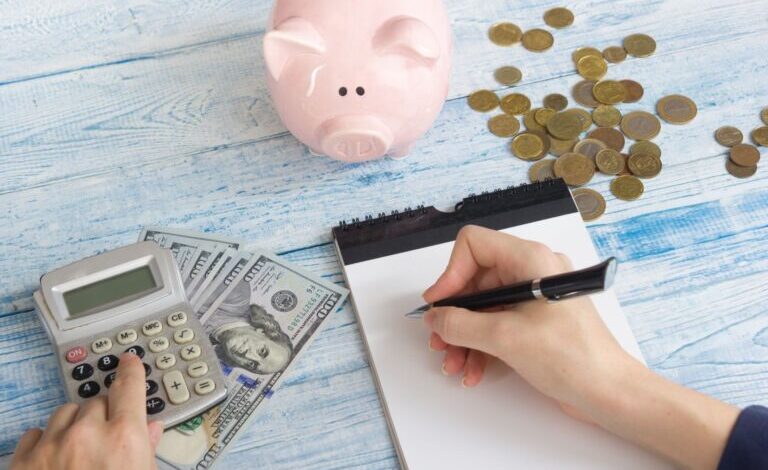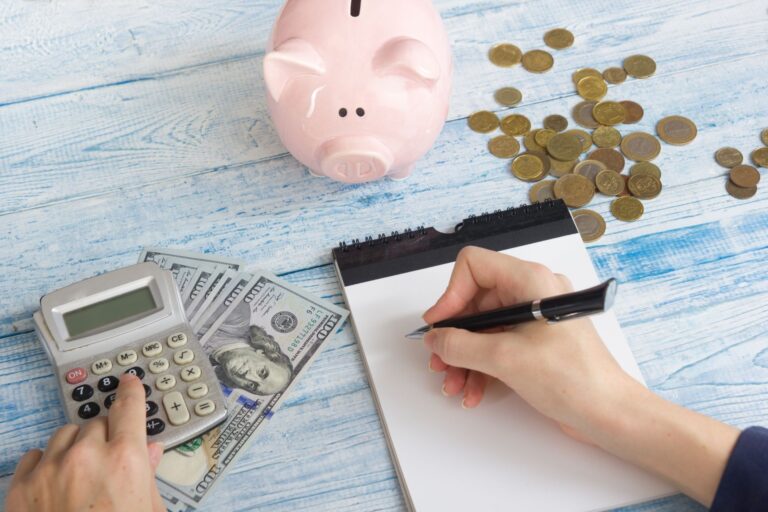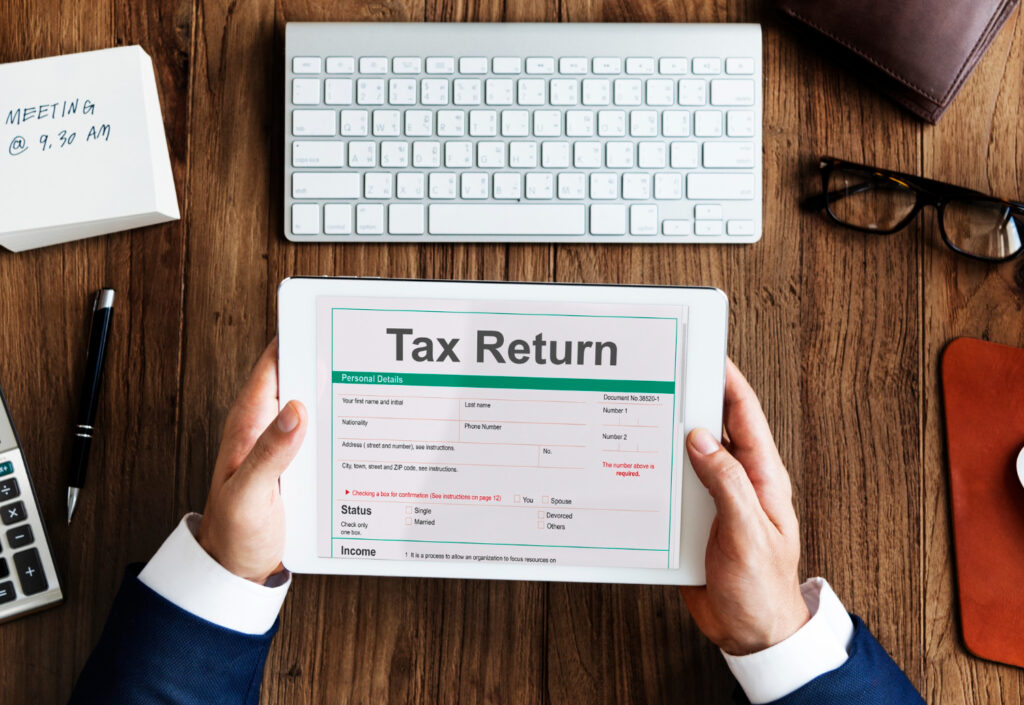12 Best Money Habits That’ll Actually Transform Your Bank Account

You’re tired of living paycheck to paycheck, watching your friends go on vacation while you’re calculating if you can afford that extra guacamole at Chipotle.
Yeah, I’ve been there too, staring at my bank account at 2 AM wondering where all my money went.
Here’s the thing: building wealth isn’t about making six figures or winning the lottery. It’s about developing the best money habits that actually stick.
And no, I’m not going to tell you to stop buying coffee (though we should probably talk about that $7 latte habit).
After digging myself out of a mountain of credit card debt and finally building a savings account I’m not embarrassed to look at, I’ve learned that small, consistent actions beat grand gestures every single time. Ready to stop being broke? Let’s get into it.
What Are Good Money Habits Anyway?
Before we jump into the nitty-gritty, let’s clear something up. Good money habits aren’t about depriving yourself of everything fun.
They’re simply the positive, repeatable actions you take with your cash that move you closer to financial freedom instead of further into debt.
Think of it like this: brushing your teeth is a habit that prevents cavities. Saving 20% of your paycheck is a habit that prevents you from eating ramen noodles when you’re 70.
We’re talking about things like automatically saving before you can spend, tracking where your money actually goes (spoiler: it’s probably DoorDash), and investing in your future self. These aren’t complicated Wall Street strategies. They’re simple behaviors that compound over time.
Why You Absolutely Need to Develop Good Money Habits
Look, I could give you a boring lecture about financial responsibility, but let’s be real. You need good money habits for three main reasons, and they all matter way more than you think.
1. Good Money Habits Create Real Financial Stability
Financial stability isn’t just some fancy term finance bros throw around. It’s the difference between panicking when your car breaks down and calmly handling it because you’ve got an emergency fund.
I’ll never forget the relief I felt when my laptop died right before a huge work deadline, and instead of freaking out, I just… bought a new one. No credit card debt. No borrowing from family. That’s what financial stability feels like, and honestly? It’s addictive.
When you develop the best money habits, you stop living in constant fear of the next unexpected expense. You can actually sleep at night without doing mental math about whether you can afford groceries AND gas this week.
2. Good Money Habits Secure Your Future (Yes, Even the Distant One)
Future you is going to either thank you or curse you out. There’s really no in-between here.
Every dollar you save and invest today is working for you tomorrow. Compound interest is basically magic, but only if you start early enough to let it work. Wait until you’re 45 to start thinking about retirement? You’re going to have a rough time.
I started contributing to my 401(k) at 24, and even though it felt painful at first, watching that balance grow has been incredibly satisfying.
Your future self deserves a comfortable retirement, the ability to send your kids to college without drowning in Parent PLUS loans, and maybe even that beach house you’ve been dreaming about.
3. Good Money Habits Give You Peace of Mind
This one’s huge, and nobody talks about it enough. Financial stress will absolutely wreck your mental health.
I remember lying awake at 3 AM, calculating how long it would take to pay off my credit cards while making minimum payments. The anxiety was crushing. Every time my phone buzzed, I worried it was a collections call. That’s no way to live.
Once I got serious about building better financial habits, that weight lifted. I stopped avoiding my bank account. I could enjoy dinner with friends without mentally calculating if I could afford my portion. The peace of mind that comes with financial control? Absolutely priceless.
12 Best Money Habits To Transform Your Finances
Alright, enough theory. Let’s get into the specific habits that’ll transform your finances from disaster zone to well-oiled machine.
1. Figure Out Where Your Money Is Actually Going

You can’t fix what you don’t measure. Seriously, this is step one, and you can’t skip it no matter how uncomfortable it makes you.
Start by looking at your monthly income. What’s your actual take-home pay after taxes? Write it down. Now comes the fun part (and by fun, I mean potentially horrifying).
Track every single expense for at least one month. And I mean everything. That $3 coffee, the $12 you spent on a mobile game, the subscription services you forgot you even had. Use an app like Mint or YNAB to make this easier.
Break your spending into categories: necessities (rent, groceries, insurance, transportation) and extras (restaurants, entertainment, that impulse Amazon purchase at midnight).
You might be shocked at where your money is actually going. I know I was when I realized I was spending $200 a month on takeout. Ouch.
Don’t forget about debt payments either. List out every credit card, student loan, and car payment, including the interest rates and minimum payments. This complete picture of your cash flow is the foundation for everything else.
2. Build a Budget (And Actually Stick to It)

I know, I know. Budgeting sounds about as fun as doing your taxes while getting a root canal. But hear me out: a budget is just a plan for your money. It’s not a restriction, it’s permission to spend guilt-free within your limits.
The 50-30-20 rule is probably the easiest place to start. It breaks down like this: 50% of your income goes to needs, 30% to wants, and 20% to savings and debt payoff. Simple, right?
So if you’re bringing home $3,000 a month, that’s $1,500 for needs (rent, utilities, groceries, insurance), $900 for wants (dining out, hobbies, Netflix), and $600 for savings and crushing that debt.
Now, your percentages might need adjusting based on where you live and your situation. Living in San Francisco? Yeah, that 50% for needs might be more like 65%. The point is having a framework.
Use whatever tool works for you. A spreadsheet, an app like EveryDollar, or even old-school pen and paper. Just track it consistently. I check my budget every Sunday morning with my coffee, and it’s become as routine as brushing my teeth.
3. Create an Emergency Fund Before Anything Else

This is non-negotiable. An emergency fund is the difference between a minor inconvenience and a complete financial catastrophe.
Life loves throwing curveballs. Your transmission fails. You need an emergency dental procedure. Your company does layoffs and you’re suddenly job hunting.
Without an emergency fund, these situations force you onto credit cards, and suddenly you’re in a debt spiral that’s incredibly hard to escape.
The goal is to save three to six months of living expenses. If that sounds impossible right now, start smaller. Aim for $1,000 first. That covers most minor emergencies and gives you a buffer so you’re not living on the edge constantly.
Put this money in a high-yield savings account with someone like Ally Bank or Marcus by Goldman Sachs. You want it accessible but not so accessible that you’re tempted to raid it for concert tickets.
Every month, treat your emergency fund contribution like a bill you have to pay. Even if it’s just $50, that adds up. I started with $25 per paycheck when I was dead broke, and within a year, I had $1,200 saved. It felt incredible.
4. Automate Your Savings (Because Willpower Is Overrated)
Let’s be honest: relying on willpower to save money is like relying on motivation to go to the gym. It works great until it doesn’t, and then you’ve blown three months of progress.
This is where automation becomes your best friend. Set up automatic transfers from your checking account to your savings account right after payday. If you never see the money, you won’t miss it.
I have mine set up so that 20% of every paycheck automatically goes into savings before I can even think about spending it. Out of sight, out of mind. By the end of the year, I’ve saved thousands without even trying.
Most banks make this stupidly easy to set up. Log into your account, find the automatic transfer option, and schedule it. Takes five minutes, changes your life forever.
You can automate retirement contributions too. Max out that 401(k) match from your employer (we’ll get to that later), and set up automatic contributions to a Roth IRA if you qualify. Future you will be incredibly grateful.
5. Attack Your Debt Like It Owes You Money (Because It Does)
Debt is the enemy of wealth building. Every dollar you spend on interest is a dollar that could be working for you instead of against you.
If you’ve got debt, paying more than the minimum should be one of your top priorities. Even an extra $20 or $50 a month can shave months or years off your payoff timeline and save you hundreds in interest.
There are two main strategies here: the debt avalanche and the debt snowball. The avalanche method means paying off your highest interest rate debt first, which saves you the most money mathematically. The snowball method means paying off your smallest balance first for quick psychological wins.
Personally? I used the snowball method because I needed those early victories to stay motivated. Paying off my first credit card felt amazing, even though it wasn’t the one with the highest interest rate.
If you’re drowning in high-interest credit card debt, consider a personal loan with a lower interest rate to consolidate everything.
Companies like SoFi or Discover offer competitive rates. Just make sure you’re not using this as an excuse to rack up more credit card debt.
6. Never, Ever Miss a Payment
Late fees are basically throwing money in the trash, and they add up faster than you think. Miss a credit card payment? That’s $25 to $40 gone, plus potential interest rate increases and hits to your credit score.
Your credit score affects everything: the interest rates you get on loans, whether you can rent an apartment, sometimes even job applications. Protecting it is one of the best money habits you can develop.
Set up automatic payments for at least the minimum due on everything. I have all my bills set to autopay a few days before the due date. Then I set calendar reminders to make sure there’s enough money in my checking account to cover them.
If you prefer manual control, use a bill tracking app or set up calendar alerts on your phone. Whatever system you choose, just be consistent. Missing payments is an expensive mistake that’s completely avoidable.
7. Review Your Insurance Coverage Every Year
Insurance is one of those things you set up once and then forget about, right? Wrong. Your life changes, and your insurance needs to change with it.
Got married? Had a kid? Bought a house? Your insurance coverage from three years ago probably doesn’t cut it anymore. Set an annual reminder to review all your policies: health, auto, home or renters, life, and disability.
Make sure your coverage actually matches your current situation. You might be paying for coverage you don’t need, or worse, you might be underinsured and not even know it until disaster strikes.
I review mine every January, and last year I discovered I was paying for rental car coverage on my auto insurance even though my credit card provides that benefit. Dropped it and saved $120 a year. Not life-changing money, but it adds up.
Also, shop around. Insurance companies bank on your laziness. Getting quotes from competitors every few years can save you hundreds. Websites like Policygenius make this process pretty painless.
8. Live Within Your Actual Means (Not Your Imaginary Ones)
This is probably the most important habit on this entire list, and it’s the one people struggle with most. Living within your means simply means spending less than you earn. That’s it. Sounds simple, but it’s shockingly hard in practice.
We live in a world designed to make you spend money you don’t have. Instagram influencers flaunting lifestyles funded by credit card debt. Friends suggesting expensive restaurants. The pressure to keep up is real.
Here’s the truth: that coworker with the new car and designer clothes? They might be drowning in debt. You have no idea what someone’s actual financial situation is, so stop comparing yourself to them.
If you make $50,000 a year, you can’t live like you make $80,000. It’s basic math, but our brains are excellent at justifying purchases we can’t afford. “I’ll just put it on the credit card and pay it off next month.” Sure, Jan.
Create a lifestyle you can actually afford. That might mean a smaller apartment, a used car instead of new, cooking at home more often. It’s not glamorous, but it’s the foundation of building real wealth.
I downsized my apartment and got a roommate for two years to accelerate my debt payoff. Was it my dream living situation? No. But it freed up $600 a month that went straight to crushing my credit card balances. Temporary sacrifice, permanent results.
9. Start Planning for Retirement Today (Not Tomorrow)

Retirement feels like a million years away when you’re young, but that’s exactly when you need to start saving for it. Compound interest needs time to work its magic.
Let me give you a quick example. If you invest $200 a month starting at age 25, assuming a 7% average annual return, you’ll have about $525,000 by age 65. Wait until you’re 35 to start? You’ll only have about $244,000. That ten-year delay costs you over $280,000. Ouch.
If your employer offers a 401(k), especially with matching contributions, sign up immediately. Employer matching is literally free money. If your company matches 50% of your contributions up to 6% of your salary, and you’re not contributing at least 6%, you’re leaving money on the table.
Not sure how much to contribute? Start with whatever gets you the full employer match, then work your way up to 15% of your gross income if possible. Can’t afford 15% right now? Start with 5% and increase it by 1% every time you get a raise.
Also consider opening a Roth IRA with Vanguard or Fidelity. You contribute after-tax dollars, but the growth and withdrawals in retirement are tax-free. It’s an incredible deal, especially if you’re young and in a lower tax bracket now.
10. Maximize Your Employer Benefits (You’re Probably Missing Free Money)
Your salary is just one part of your compensation package. Most people completely ignore the other benefits their employer offers, and it’s costing them thousands.
Beyond the 401(k) match we already talked about, dig into what else your company offers. Many provide life insurance and disability insurance at group rates that are way cheaper than buying policies individually. Take advantage of these.
Does your employer offer a Health Savings Account (HSA)? If you have a high-deductible health plan, an HSA is one of the best tax-advantaged accounts available.
Contributions are tax-deductible, growth is tax-free, and withdrawals for medical expenses are tax-free. It’s like a super-powered retirement account that can also cover healthcare costs.
Some companies even match HSA contributions up to a certain amount. Again, free money. Don’t leave it sitting there.
Check if your employer offers legal services too. Mine provides free consultations and discounted rates for things like estate planning. I used it to get my will drafted for a fraction of what it would have cost otherwise.
Flexible Spending Accounts (FSAs) for healthcare or dependent care can also save you money by using pre-tax dollars. Just be careful because most FSAs have a “use it or lose it” policy at the end of the year.
11. Get Smart About Taxes (Legally Pay Less)

Nobody enjoys paying taxes, but most people pay more than they need to because they don’t understand deductions and tax-advantaged accounts.
Contributing to retirement accounts like a 401(k) or traditional IRA reduces your taxable income. If you’re in the 22% tax bracket and contribute $6,000 to a traditional IRA, you just saved $1,320 in taxes. That’s significant.
If you own a home, you can deduct mortgage interest and property taxes (up to certain limits). Donate to charity? Keep those receipts because charitable contributions are deductible if you itemize.
Have student loans? You can deduct up to $2,500 in student loan interest paid, even if you don’t itemize. That’s money back in your pocket just for paying off debt you already owe.
HSAs, as mentioned earlier, offer triple tax advantages. FSAs provide tax savings on healthcare and dependent care costs. Even 529 college savings plans offer state tax deductions in many states.
I’m not saying you need to become a tax expert, but spending an hour or two learning the basics can save you thousands. Consider using tax software like TurboTax or H&R Block, or hire a CPA if your situation is complex. The cost is usually worth it.
12. Build Multiple Income Streams (Don’t Put All Your Eggs in One Basket)
Relying solely on your 9-to-5 job for income is risky. Companies downsize. Industries change. Having multiple income streams provides security and accelerates your wealth building.
This doesn’t mean you need to work 80 hours a week. Start small with a side hustle that leverages skills you already have. Freelance writing, graphic design, tutoring, consulting in your field of expertise. Even an extra $500 a month adds up to $6,000 a year.
I started freelance writing on weekends, and within six months, I was making an extra $1,000 a month. That money went straight to my emergency fund and then to investments. It completely changed my financial trajectory.
Once you’ve built up some savings, consider investing in assets that generate passive income. Rental properties, dividend-paying stocks, REITs (Real Estate Investment Trusts), or even creating digital products like online courses or eBooks.
Platforms like Upwork, Fiverr, and Etsy make it easier than ever to monetize your skills. You could also start a blog or YouTube channel about something you’re passionate about. It takes time to build, but the potential is huge.
The key is diversification. Multiple smaller income streams are often more stable than one large one. If you lose your job, you still have other money coming in while you search for the next opportunity.
Final Thoughts
Look, building the best money habits isn’t about being perfect. It’s about being consistent and making slightly better choices over time. You’re going to mess up. You’ll have months where you overspend or forget to review your budget. That’s human.
The difference between people who build wealth and people who stay broke isn’t intelligence or income level. It’s habits. Small, boring, unsexy habits that compound over time into financial freedom.
Start with one or two habits from this list. Maybe it’s automating your savings or finally creating that emergency fund. Once those become automatic, add another habit. Build momentum slowly.
I promise you, five years from now, you’ll look back and be amazed at how far you’ve come. That anxiety about money? It fades. The constant stress? It lifts. You’ll sleep better, enjoy life more, and actually look forward to checking your bank account.
Your financial future isn’t determined by how much you make. It’s determined by what you do with what you make. So stop waiting for the perfect time to start. The perfect time was yesterday. The second-best time is right now.
Now get out there and start building those money habits. Your future self is counting on you, and trust me, they’re going to be so grateful you started today. 🙂








